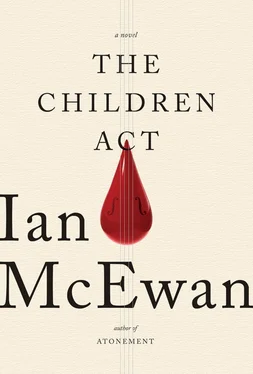Mr. Julian Bernstein, reedily tall, like one of the rushes that hid the infant Moses, apologetically stooped over court papers, sidelocks stirring moodily as his barrister accused his wife of being unable to separate her own needs from the children’s. What she said they needed was whatever she wanted for herself. She was wrenching the girls away from a warmly secure and familiar environment, disciplined but loving, whose rules and observances provided for every contingency, whose identity was clear, its methods proven through the generations, and whose members were generally happier and more fulfilled than those of the secular consumerist world outside—a world that mocked the spiritual life and whose mass culture denigrated girls and women. Her ambitions were frivolous, her methods disrespectful, even destructive. She loved her children far less than she loved herself.
To which Judith responded huskily that nothing denigrated a person, boy or girl, more than the denial of a decent education and the dignity of proper work; that all through her childhood and teenage years she had been told that her only purpose in life was to run a nice home for her husband and care for his children—and that too was a denigration of her right to choose a purpose for herself. When she pursued, with great difficulty, her studies at the Open University, she faced ridicule, contempt and anathemas. She had promised herself that the girls would not suffer the same limitations.
The opposing barristers were in tactical agreement (because it was plainly the judge’s view) that the issue was not merely a matter of education. The court must choose, on behalf of the children, between total religion and something a little less. Between cultures, identities, states of mind, aspirations, sets of family relations, fundamental definitions, basic loyalties, unknowable futures.
In such matters there lurked an innate predisposition in favor of the status quo, as long as it appeared benign. The draft of Fiona’s judgment was twenty-one pages long, spread in a wide fan facedown on the floor, waiting for her to take it up, a sheet at a time, to mark with soft pencil.
No sound from the bedroom, nothing but the susurrus of traffic gliding through the rain. She resented the way she was listening out for him, her attention poised, holding its breath, for the creak of the door or a floorboard. Wanting it, dreading it.
Among fellow judges, Fiona Maye was praised, even in her absence, for crisp prose, almost ironic, almost warm, and for the compact terms in which she laid out a dispute. The Lord Chief Justice himself was heard to observe of her in a murmured aside at lunch, “Godly distance, devilish understanding, and still beautiful.” Her own view was that with each passing year she inclined a little more to an exactitude some might have called pedantry, to the unassailable definition that might pass one day into frequent citation, like Hoffmann in Piglowska v. Piglowski , or Bingham or Ward or the indispensable Scarman, all of whom she had made use of here. Here being the limp, unperused first page hanging from her fingers. Was her life about to change? Were learned friends soon to be murmuring in awe over lunch here, or in Lincoln’s or Inner or Middle Temple, And then she threw him out ? Out of the delightful Gray’s Inn flat, where she would sit alone until at last the rent, or the years, mounting like the sullen tidal Thames, swept her out too?
Back to her business. Section one: “Background.” After routine observations about the family’s living arrangements, about residence of the children and contact with the father, she described in a separate paragraph the Haredi community, and how within it religious practice was a total way of life. The distinction between what was rendered to Caesar and what to God was meaningless, much as it was for observant Muslims. Her pencil hovered. To cast Muslim and Jew as one, might that seem unnecessary or provocative, at least to the father? Only if he was unreasonable, and she thought he was not. Stet.
Her second section was entitled “Moral differences.” The court was being asked to choose an education for two young girls, to choose between values. And in cases like this one, an appeal to what was generally acceptable in society at large was of little help. It was here she invoked Lord Hoffmann. “These are value judgments on which reasonable people may differ. Since judges are also people, this means that some degree of diversity in their application of values is inevitable…”
Over the page, in her lately developing taste for the patient, exacting digression, Fiona devoted several hundred words to a definition of welfare, and then a consideration of the standards to which such welfare might be held. She followed Lord Hailsham in allowing the term to be inseparable from well-being and to include all that was relevant to a child’s development as a person. She acknowledged Tom Bingham in accepting that she was obliged to take a medium- and long-term view, noting that a child today might well live into the twenty-second century. She quoted from an 1893 judgment by Lord Justice Lindley to the effect that welfare was not to be gauged in purely financial terms, or merely by reference to physical comfort. She would take the widest possible view. Welfare, happiness, well-being must embrace the philosophical concept of the good life. She listed some relevant ingredients, goals toward which a child might grow. Economic and moral freedom, virtue, compassion and altruism, satisfying work through engagement with demanding tasks, a flourishing network of personal relationships, earning the esteem of others, pursuing larger meanings to one’s existence, and having at the center of one’s life one or a small number of significant relations defined above all by love.
Yes, by this last essential she herself was failing. The Scotch and water in a tumbler at her side was untouched; the sight of its urinous yellow, its intrusive corky smell, now repelled her. She should be angrier, she should be talking to an old friend—she had several—she should be striding into the bedroom, demanding to know more. But she felt shrunken to a geometrical point of anxious purpose. Her judgment must be ready for printing by tomorrow’s deadline, she must work. Her personal life was nothing. Or should have been. Her attention remained divided between the page in her hand and, fifty feet away, the closed bedroom door. She made herself read a long paragraph, one she had been dubious about the moment she had spoken it aloud in court. But no harm in a robust statement of the obvious. Well-being was social . The intricate web of a child’s relationships with family and friends was the crucial ingredient. No child an island. Man a social animal, in Aristotle’s famous construction. With four hundred words on this theme, she put to sea, with learned references (Adam Smith, John Stuart Mill) filling her sails. The kind of civilized reach every good judgment needs.
And next, well-being was a mutable concept, to be evaluated by the standards of the reasonable man or woman of today. What sufficed a generation ago might now fall short. And again, it was no business of the secular court to decide between religious beliefs or theological differences. All religions were deserving of respect provided they were, in Lord Justice Purchas’s phrase, “legally and socially acceptable” and not, in Lord Justice Scarman’s darker formulation, “immoral or socially obnoxious.”
Courts should be slow to intervene in the interests of the child against the religious principles of the parents. Sometimes they must. But when? In reply, she invoked one of her favorites, wise Lord Justice Munby in the Court of Appeal. “The infinite variety of the human condition precludes arbitrary definition.” The admirable Shakespearean touch. Nor custom stale her infinite variety . The words derailed her. She knew the speech of Enobarbus by heart, having played him once as a law student, an all-female affair on a lawn in Lincoln’s Inn Fields one sunny midsummer’s afternoon. When the burden of bar exams had recently been lifted from her aching back. Around that time, Jack fell in love with her, and not long after, she with him. Their first lovemaking was in a borrowed attic room that roasted under its roof in the afternoon sun. An unopenable porthole window gave a view east of a slice of Thames toward the Pool of London.
Читать дальше












